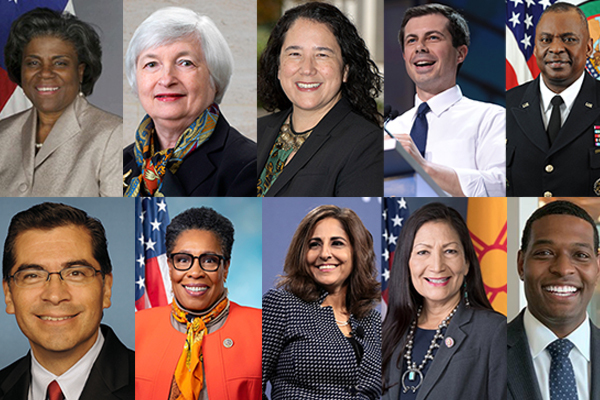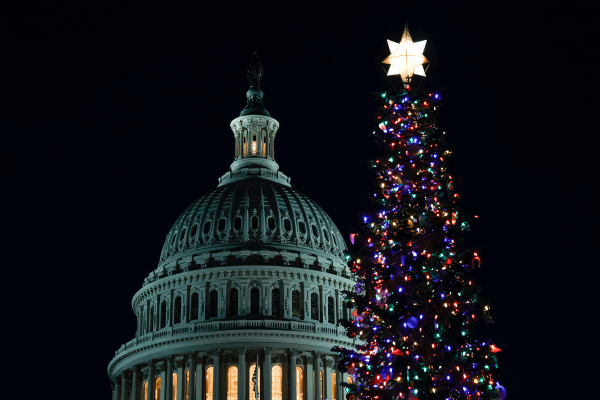President-elect Joe Biden has promised to have the “most diverse Cabinet” in U.S. history, but is the Cabinet religiously diverse? The answer, experts explain, must go beyond tracking the identities of various appointees; a diverse administration must have the power to impact policy for the communities they represent.
“I promise you, you'll see the most diverse Cabinet representative of all folks, Asian Americans, African Americans, Latinos, LGBTQ, across the board,” Biden told CNN in December.
Among Biden’s nominations are his Cabinet — which includes Vice President-elect Kamala Harris and 15 heads of executive departments — as well as 10 other Cabinet-level positions. In this group there are eight Catholics, seven Jews, one Episcopalian, and two Baptists; the religious identities of the other eight appointees are unknown. (One nominee, Tom Vilsack, is Catholic according to some websites, but this could not be confirmed by Sojourners). The Biden transition team did not respond to requests for comment.
But Amy Black, a professor of political science at Wheaton University, cautioned against evaluating diversity strictly by numbers and percentages — an approach that can feel like a “quota system,” something she finds “forced and problematic.”
The staffing of the Biden administration “need not be an attempt to mirror perfectly the percentile representation by religion of American population,” said Black, who co-authored a report on Christianity and pluralism in 2020. What matters more, she explained, is “making sure there are individuals in important positions of power from different religious backgrounds, who can ... help us make sure that we understand the needs, concerns, and impacts on different religious communities.”
For example, Black noted that though Muslims, Hindus, and Jews are smaller percentiles of the religious landscape in America, she hopes the Biden administration will ensure these communities’ priorities are heard, especially since these groups are disproportionately targeted because of their religion. According to the FBI’s 2019 hate crime statistics, released in November of 2020, most religious hate crimes were motivated by anti-Semitic or anti-Islamic bias, 60 and 13 percent, respectively.
Muslims also faced discrimination during President Donald Trump’s administration; beyond his anti-Islamic rhetoric, the president signed an executive order blocking travelers from seven Muslim-majority countries. Biden, according to his chief of staff, Ron Klain, will overturn the ban on Inauguration Day.
On Wednesday, Biden will be sworn in as president in an inauguration themed around “America United.” This goal, long at the center of Biden’s vision for the country, will be attempted at a moment when awareness around disunity is high. Rev. Jen Bailey, founder and director of the Faith Matters Network, said that a commitment to diversity that goes beyond representation could help usher in that healing.
“This notion of being in a pluralistic society in which religious diversity is elevated alongside — and not seen as separate from — other markers of people’s experiences is really important,” Bailey said. “Particularly when we find ourselves in such deep … spiritual crisis around the questions of identity, of who we’re going to be as a country.”
She stressed the necessity of shared power in diversity. She said that America’s potential of becoming a truly multiethnic, multiracial, multi-religious democracy rests in its ability to accept the death of an America where certain ethnic, racial, and religious groups have held disproportionate power. Out of that death, as the Christian tradition teaches, can come life and flourishing, she said.
“I don’t know that we’ve ever done much in our government beyond representational diversity,” Bailey said. “I’m in a wait-and-see pattern with this administration, as I would be with any incoming administration, to see if the results of their efforts to diversify who’s at the table results in a different type of policy making.”
The Center for American Progress, whose president, Neera Tanden, was nominated by Biden to be director of the Office of Management and Budget, had several recommendations for how the Biden administration might fulfill its goal in regard to religious communities.
“America’s diverse religious communities care deeply about the critical issues facing our country, including the coronavirus pandemic, systemic racism, a devastated economy, and climate change,” Maggie Siddiqi, director of the Faith and Progressive Policy Initiative at CAP, said in a news release. “The new administration has an opportunity to work with religious communities as part of its efforts to unite Americans in support of a public policy agenda.”
For a full list of who Biden has selected for his Cabinet and Cabinet-level postions click here.
Got something to say about what you're reading? We value your feedback!






